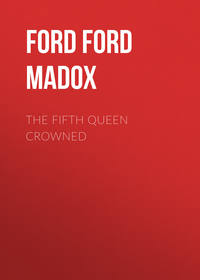 полная версия
полная версияThe Young Lovell
The Bishop, upon the monk's arm passed slowly down this corridor to his chamber which had bare walls painted yellow in honour of St. Cuthbert; a great quantity of books, very big or very little, were upon shelves. A great many manuscripts in rolls lay upon other shelves, and papers that overflowed from chests, of which there were five, along one wall. There was a pallet bed in this room; a three-cornered stool and a coarsely hewed lectern; a prie-dieu and a crucifix. Thus it was a very bare room. This Bishop, though he affected somewhat great state before the people, was, in secret, a very ascetic man.
Few people, however, came into this bare room – not even his highest officers. The square windows – but that had been done in Bishop Skirlawe's days just a hundred years ago – were filled with bright glass, showing once again the history of the translation of St. Cuthbert. All in little squares this history was, monks with shaven heads crouching down as if the space would not contain them, and the head of Dun Cow showing yellow against a background of glass shining like pigeon's blood rubies. One of these little, square casements hung open and through it the distant landscape showed clear, with hills grey and woods grey-blue, astonishing for its tranquillity.
So, the monk Francis being sat up on his three-legged stool, the Bishop began to pace up and down before the long window space – backwards and forwards over the tiles, with an immense swiftness. Once he turned his face imperiously to where the monk sat and said harshly:
"Pray God, you bring me no ill news."
The monk, who had been gazing, out of respect, at the tiles, raised his glance to say:
"I think it is rather good news."
The Bishop said:
"I thank God!" and touched his fur cap. Once again he resumed his pacing, biting his lips and clenching and unclenching his fingers.
Suddenly, in the stillness there resounded a rustle of wings, and, balancing unsteadily upon the iron frame of the open window, there appeared a blue pigeon that craned its head to one side or the other, watching the Bishop. From outside there came a still greater rustle of wings.
Then the monk's face grew colourless.
"Father in God," he said in a low voice, "what is that fowl?"
The Bishop turned his lean head round over his shoulder, when he saw the pigeon that gazed anxiously at him, he smiled a kindly and soft smile.
"That is my weakness, Brother Francis," he said. With his brushing step he crossed the smooth tiles towards one of the chests that was filled with parchments. As he lifted the lid that pigeon flew from the window on to his shoulder. And immediately another pigeon took its place in the opening. "Brother Francis," he continued, "you are a stern man, yet be indulgent to my weakness. It was your namesake that was called 'of the Birds.' And in Scripture you may read the exhortation: 'Be ye guileless as doves and with the wisdom of the serpent.'" So he lifted that chest-lid and took from it a little linen bag of pease.
Then the face of the monk became radiant.
"Father in God," he said, "I thank heaven for this. For those very words I used twenty hours ago and now you use them again."
"Why," the Bishop said, "what harm ever came from these pretty fowls of heaven?" The pigeon on his shoulder stretched its neck out to reach his mouth with its bill. Urgently and insistently it did this. And others were entering the window space. Then, before the flutter of their wings should drown his voice, the Bishop said that these birds reminded him that his dinner hour was come. And he begged the monk Francis to tell a page that he should find amongst the men-at-arms in the gallery that the Lord Bishop would have his guests sit down to dinner and eat with a good appetite; whereas he himself was a little indisposed and would have his own cook send up to him four eggs with a little saffron and some of the drink called clary, such as the cook knew he wished for when he was ill. So, the monk Francis went out and, after some time, found that page, who was playing knucklebones with another in the stairway. And when the monk had cuffed him well he sent him upon his errand, and so went back to the room. The Bishop was smiling down at from twenty to thirty pigeons. They were around his feet, upon his bed where he had sat down, upon his knees and, precariously they found footholds, fluttering their wings upon his moving arms.
So there he sat, looking upon those fowls of the air and smiling. And in a little time that page brought him the four eggs, the saffron and the beverage called clary. And so the Bishop ate his meal, sprinkling the saffron upon the eggs. He scattered fragments of the hard yolk amongst the pigeons. And when he was done and had drunk his drink he shook the crumbs off his gown and came over towards the monk Francis, all the pigeons scattering before his feet.
The Bishop was a man much taller than the monk and much thinner in the features. That is to say that, of late years, he had grown thin with his cares, but his purple and furred gown gave him a certain bulk. So he looked down upon the monk and said:
"My brother in God, you have perceived my weakness, for each day I spend certain minutes upon these birds and gain comfort from the contemplation of their beauty and guilelessness. And I think they are the only friends I have, so lonely is my state in these great and peopled halls. Time was, no doubt, when a Prince Bishop was beloved, dwelling amongst people of a simple piety. And in such a day I could have done well. But, as I have often told you, my brother, in this place I cannot see my way. I am troubled with many doubts. If these were again the days of St. Thomas of Canterbury, I could at least extend my neck to the butcher's sword. I think I should have had that courage… But this then is my road and in which God has set me. And very willingly I totter along it. Only, from time to time, my brain reels; I seem to see nothing, amongst great defiles, with rocks that roll down upon me. And this my see appears like a little church set between towering precipices… And so I rest my brain by playing with these birds."
"So," the monk Francis said, "St. Gerome had a lion, that lightened his labours and the solitude of his cell, and so many other saints had."
"But I am no saint," the Bishop said, "and have no licences so to disport myself as they had… But even so it is! God give me guidance. For it is certain that the King that we have hates me a little and in some sort fears me. And he is a strong, persevering and cunning prince. And I do take him to be an evil prince that murdered a very good King, my friend and the friend of this see. And if I had courage and could see clearly, I should raise up the standard of this my see and call to me the barons and the knights and so, in a crusade, march to the dethroning of this King. But, as you know, I am not framed for such a part. I am no commander, neither has God given me the golden gift of oratory to inflame men's hearts to a holy war. Nor yet, in this age, is the spirit of piety abroad among the people, and I know not who are my friends… So here I sit in doubt and perplexity. And now there is come, even to this my city, a man calling himself commissioner of this upstart King. For such a man thundered upon the city gates last night. And very willingly I could have refused him entrance, but in my trouble and perplexity I did not dare. What say you then, brother Francis, to all these things, for I will hear you very willingly?"
The monk kept his eyes for some time longer upon the floor and at last he spoke:
"My lord and prince," he said, "pardon me beforehand if in what I shall tell you now I have done aught amiss. But this I will tell you at once: this commissioner of King Henry's is a subtle spy. Therefore, taking upon my own person the shame, if shame there be, I have set myself to counterspy him. For it fell out in this way: in certain secret manners – not under seal of confession – I have known for some time past that this Sir Bertram of Lyonesse, was gathering news of the North parts. There are certain contractors for the building of our Tower in Belford, and one of them is called Richard Chambre, a burgess of Newcastle. And because I have lent him now and then a little money and much good advice, this contractor is my good friend and child. So one day, last September, this Richard Chambre told me, whilst devising of other things, that there was one, John of Whitley, a burgess of Newcastle, that went gathering news for a knight of the King's court called Sir Bertram, of Lyonesse. He was writing him letters and the like, and this John of Whitley had come to Richard Chambre, and had asked him for news of our monastery of Belford, and of how we monks were affected towards the new King… And so, gathering here a piece of news and there another, I gathered that this Sir Bertram had agents here and there – one a monk in Alnwick called Ludovicus and another, a bailiff of our own, called the Magister Stone at Castle Lovell. But that Magister is much in Durham…"
"God help me," the Bishop said, "I have seen him often upon the affairs of the Knights of Cullerford and Haltwhistle…"
"Well, he is an agent of that Sir Bertram's," the monk said. "Now let me go on further with my story."
"But this is very terrible hearing," the Bishop said. "All this spying and treachery is a new thing. It is even as it is in Italy."
"This is a new age, Father in God," the monk said, "and you will find this King to employ as many spies as any Duke Borgia or of Ferrara. And so it will go from bad to worse. Therefore let us be prepared… So this matter is: I came this morning, riding with a certain knight and lord, to Framwell Gate Bridge, just as they opened it. And because I would speak certain private words with that lord I had ridden with him a mile ahead of his spears. So we waited at the bridge for them to come up. Then I fell a-talking with the captain of the bridge as to the news and so I heard, as ye know, that this same Sir Bertram, calling himself commissioner of the King had come in last night with the old Princess of Croy and her train – but his own train had been sent to lodge in Old Elvet. So I learned where he was, for every woman in the street could tell me.
"I went swiftly afoot to the house of the Princess of Croy, and the door stood open with the old steward before it, chaffering with a fisherman. So, frowning fiercely upon that steward, I crept up that stairway, my sandals making no sound, and going higher than the door, I stood upon the stairs and had a fair view of this Sir Bertram and heard much of what he said… I would have come to you the sooner, Father in God, but this was a very pertinent matter and I heard you were saying of mass."
Then the monk Francis reported to the Prince Bishop much of what that Sir Bertram had said, but keeping back some of it for the time. The Bishop stood before him, clasping and unclasping his hands; the pigeons, having dispersed about the tiles in the search of pease that had rolled away, flew now, by ones and twos, out of the little window again.
In the view of the monk Francis the coming of this Sir Bertram meant, as he under-read that knight's words, an immediate calm in those parts, but afterwards, in three years or four, a much greater danger. For, as the monk saw it, it was the design of that King Henry Seventh to show himself to the great lords of the North, a very kind, indulgent and lenient ruler. So he should gather them under his wing to be a potent engine against that see of Durham, that powerful kingdom within his kingdom. Thus, for the time being, the monk perceived no danger for that see. He thought – and time would very likely prove him right – that that Sir Bertram would begin, to the Bishop as to the great lords, with kind and soothing words, or even with presents. So, peace being there established and the memory of King Richard forgotten, the King would begin to move the lords of the North against that bishopric. And, doubtless, the further extent of his design – the bishopric being weakened by the meeting of the lords – would be to lop off the great lords, one by one, advisedly and with caution until the King had the upper hand of all in those parts…
"This is a very fell scheme, my brother," the Bishop said. "I had rather the King would march upon me with his flags on high."
"So would all the King's enemies," the monk Francis said, "for that would bring him down. He is not strong enough for that." He paused for a moment: "If my lord and prince will let me speak my mind…" he began again.
"You are here for that," the Bishop said. "What I need is counsel."
"Then I will say this," the monk Francis began again: "To a mine you set a countermine and so may we. This subtle King will by acts of graciousness win the North parts to him. My lord and prince under God, you may do this very much more easily than he. For, by the grace of God, in these days you are a very wealthy Prince but he for a King is very poor, he having great expenses for wars in France and elsewhere where rebellions break out. And acts of graciousness, in this world, end either in gifts of money or the remission of fines, rents and amercements. These this King cannot come to do, or he will starve. But all these things you can do very easily. If he can spare the nobles a little he will do it, but he must then press the more heavily upon the commons and so great cries against him will rise up in these parts… But you, lord and prince, can be gracious to all. And so I would have you show yourself. Thus, at the end of three or four years this King may find himself only the poorer for his efforts."
"I hope you may be right," the Bishop said.
"Time will show it," the monk answered, "and the grace of God. Now I will talk to you of the Young Lovell… He is come here again."
"God help me," the Bishop said, "I have been talking of him all this morning."
The monk Francis said:
"Ah, that is what I had thought. And it was with that bailiff – the lawyer, Master Stone."
"It was even with him," the Bishop said. "He seemed a worthy and a pious man and full of zeal for this see of Durham."
"Well, you shall hear," the monk said. "I will wager he came with this advice – that you should lay hands upon the estates of the Young Lovell under a writ of sorcery, and so divide them between yourself and the Knights of Haltwhistle and Cullerford. Thus you should be beforehand with the Earl of Northumberland who would do as much for the King's disgrace in these parts."
"It was even that that he reded me do," the Bishop said. "He urged the see should gain much good land thereby."
"And lose much worship," the monk said. "It is that that Sir Bertram wishes."
"I can see as much as that," the Bishop answered. "And this Master Stone – who is an ill-looking man – never told me that the Young Lovell, as you say, was come again, but said that he was dead and that Cullerford and Haltwhistle, being by marriage his heirs, would very willingly divide with me. He was insistent with me to issue that writ this afternoon."
"Well, it was a clever, foul scheme," the monk Francis said. "For well that bailiff knew the Young Lovell had been seen riding into Castle Lovell! Hard he has ridden here – if a lawyer can ride hard – to get that writ against the Young Lovell or ever we could come to you. So with that he would have earned great disgrace for you and this see. But what I would have you do is to confirm, as far as the see goes, that Young Lovell in his inheritance. So it will rest with the King, the Earl of Northumberland, and this Sir Bertram to dispossess him. And thus shall their names stink in the nostrils of all this country-side. For that young man is very beloved, by gentle and simple, having fought well against the false Scots at Kenchie's Burn, as these eyes did see."
The monk spoke long and earnestly in that sense; and indeed he had the right of it. There would have been none in that country that would not have cried shame on the Church for her greed, if the Bishop had divided these lands with foul knights like Sir Walter Limousin and Symonde Vesey and Vesey the outlaw and the Decies. But if the Bishop would confirm Sir Paris Lovell in the lands over which the see had rights and overlordships, great discredit would fall upon the Percy for having, in a Warden's Court, essayed to ruin the Young Lovell on a false charge.
And after the monk Francis had talked in that way for some time, the Bishop was convinced of – nay he shuddered at – the trap into which he had nearly fallen. But, he said, the lawyer Stone had so bewildered him with one legal point and another – such as how the Decies, being knighted and plighted by the Prince Bishop himself in the name of the Young Lovell, had all the rights forfeited by that lording. He would very willingly resign a portion of his rights by way of fine; it was, moreover, in the protocol of the Bishops of Durham that no Bishop could refuse such a gift freely made, to the disadvantage of the see. And the lawyer said, from his knowledge of canon law, that, the Bishop having made the Decies into Young Lovell and a knight of the Church and the betrothed of the Lady Margaret of Glororem, nothing could undo all those things but a bull or dispensation of the Pope.
"Well," the monk Francis said, "I have considered that point and have read in such books as our poor monastery hath, both upon the canon and the civil law – such as the book of decrees of which the first leaf begins 'Jejunandi' and the penultimate leaf ends 'digestus erif,' or the book of decretals which begins 'Nullain res est' and ends: 'in causa negligenciae.' Also I have spoken with the most learned of our brethren upon this case and with your sergeants of law and your justices and all with one accord agree that a long law case might be made out of it. That Decies hath his grounds of appeal, at least upon the matter of knighthood and betrothal. For it is very uncertain if you could unknight him or break his betrothal with the Lady Margaret of Glororem without an appeal to our Father in Rome.
"As to the matter of the other rights conveyed by that name, that is much simpler. For the Young Lovell has only to make appeal to you through a person of the Church as his best friend. Then you shall give him licence, under the decretal 'in causa negligenciae' and he may at once enter upon his lands by force or how he may…"
"What then should the man called Decies do?" the Bishop asked. "I am not very learned in these laws; but that lawyer Stone said he may do great things."
"For that," the monk Francis said, "he might. But, if I can have a say with that Decies, he shall hang from a very high tree. Or, if the Young Lovell is too tender of his half-brother, for that the Decies is, the Decies shall at my complaint to your officers and, after a fair trial, be broken upon the wheel. For before a court non-ecclesiastical he hath brought false witness against a vassal of your see upon an ecclesiastical charge, to wit sorcery. There is no escape for him."
The Bishop was, by that, hot to do grace to the Young Lovell. And, after he had made the monk Francis recite over again all that he had said, he agreed very heartily to do all that that monk asked of him. For that was a position that jumped very well with Bishop Sherwood's character, and one that made all things the plainer to him. Being a churchman, subtle rather than vigorous, he desired above all things the good and glory of his see. He desired that, so much above his own glory and good, that in later years he left his see and went into exile rather than that the bishopric should suffer from the King's hatred of his person. But he could see very well that the bishopric of Durham would lose rather than gain by taking the lands of a young lord, well loved and deserving well of those parts. The Church, as he was aware, was called, in those days, avaricious, gluttonous and avid of lands and rent. But here, by a shining instance, he might show that the see-palatine of Durham held its hand and so that see should gain in credit and renown at the expense even of all other bishoprics in the realm and of the realm itself. And here was a course of action that this Bishop could very well understand and set going. Besides, of his own predilection, he had a hearty inclination towards such high and chivalric natures as was the Young Lovell's. He saw in him a shining and armoured protector against the foes of his see. Seeing things very much in symbols and pictures, this Bishop seemed to see that young lord, in silver harness, shining in the sun and raising his sword against the mists, fumes and flames that beset this fair city of Durham.
Therefore he said hastily to the monk Francis that if that monk would take a sheet of parchment and write the various matters of canon law and the rest, he, the Bishop, would commit them to memory, and, that evening he would call before him the lawyer Stone, the Young Lovell and, if it seemed advisable, the King's commissioner and announce to them what his rede was in all these matters.
So he gave the monk a great sheet of parchment from a chest and the monk turned round to the pulpit and began to write. The Bishop walked up and down behind his back, rubbing his hands delicately together with pleasure at that their scheme and at the discomfiture of the King's commissioner that must ensue therefrom.
Now let us turn for a moment to what passed in the house of the Princess Rohtraut of Croy, Lady mother of Dacre, during this time, whilst the monk wrote.
VIIAt that heavy beating of iron upon the stair the Lady Margaret and Sir Bertram of Lyonesse looked into each other's eyes, crossing glances of apprehension in the one case and of terror in the other. For the Lady Margaret was divided between joy and love and the sad and sorrowful gaze that three times the Bride of Christ had cast upon her in her dreams. Sir Bertram, for his part, was filled with dread of sorceries, fearing for his soul. For, if in matters of statecraft and the affairs of this world he was a very cool man, yet – as is often the case with those who are half men of law, half men of state, new and rising men not very scrupulous of means but solidly set upon matters of their day – this Sir Bertram quailed like a dog before thoughts of death, sorcery, the omens of superstition and hell fire. So he crossed himself again and again. For, though much of his talk with those ladies had been wary and cautious, he had very sincerely believed when he said that this Paris Lovell had been carried off by a white witch or a magic courtesan. Such things he believed in as he believed in treachery, guile, want of faith in men and the deceit that lies in women, coming from Adam's snake-wife, called Lilith.
Only the old Princess leaned forward in her throne-chair, watching the dark stone doorway with pleasant eyes, for she believed neither in the sorceries nor the prowess of her grandson, but made sure of finding him an arrant fool.
So a figure in very shining steel stood in that little painted arch. At sight of it, at the very first, the Lady Margaret cried out. For she knew very well every detail of the silken dresses and accoutrements of her lord and love. And there he stood in his armour of state, fluted, with long steel shoes and a round helmet without a plume, like the head of a bull-dog. This suit of armour she had last seen upon the Decies, and it seemed to her like a sort of sorcery that he should wear it there. For she never thought it was the Decies that stood before her; she had known too well the young lord's voice upon the stairs.
How he had come by that suit was no sorcery but a very simple matter.
At Castle Lovell, since they could by no means come at the late lord's gold in the White Tower, they were much in need of money; for they could gather no rents and no fines and no tolls. The people would not pay them. Therefore, in those months past, without remorse they had sold all such furnishings of the Castle as they could find buyers for. For the jewels of the Lady Rohtraut they could not do it very easily, since the goldsmiths of Newcastle set their heads together and would have none of them, fearing the reprisals of the Dacres and suits at law and the like. But certain hangings and furniture they sold for a good price to a German of Sunderland, who shipped them beyond the seas. And certain arms that they had, more than they had men for, they sold for what little these would fetch to certain armourers of the town of Morpeth. Amongst these had been this suit of state. For this suit was too small for the Decies; it had galled him very uncomfortably beneath the arm-pits and between the thighs, when he had played the part of his half-brother, and he had been heartily glad to be out of it. It had been too large for the Knights of Cullerford and Haltwhistle, so that they rattled inside it like walnuts in their shells in June. As for Henry Vesey of Wall Houses, the evil knight, he said he would be hanged if he wore the Young Lovell's armour, for it would bring him ill-luck. So they sold it for forty shillings to a Morpeth armourer called Simon Armstrong, who thought he had a bargain. But he found that neither knight nor esquire of that countryside would take it of him, for the reasons given by Henry Vesey. So there it was in his store.









